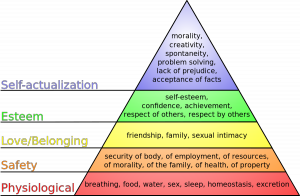Fundamental Human Needs
Humanism is based in the re-education of human value which emphasize the importance of shifting anti-human ideological beliefs into humanist based ethics and related philosophical principles. All human beings deserve humane treatment in order to live upon the planet with dignity through having basic access to supply Fundamental Human Needs. Our goal is to apply humanistic ethical philosophy blended with the spiritual principles of the Law of One to expand consciousness which inspires that these Fundamental Human Needs are met for all human beings on the earth.

If socially and culturally we do not support Fundamental Human Needs as a basic human right for all peoples of the earth, all humanitarian objectives to co-create a more benevolent and peaceful world, a world without war and tyrannical oppression, will fail.
When groups of humans are treated worse than vermin, and are denied Fundamental Human Needs to survive they are unable to function in a civilized society based on benevolence and Compassion for all human beings. Conversely, the disparity between those that are allowed resources in their community and those that are denied widens, and political tyranny and cultural terrorism are a natural byproduct of the severe imbalances created by extreme poverty and oppression.
Physiological needs are the physical requirements for human survival. If these requirements are not met for any person, family, group or community, the human body cannot function properly and will ultimately fail. Physiological needs are the most important; they should be considered as the priority with the available resources and met first.
Physiological Needs
Air, water, food and sanitation are requirements for survival in all animals, including humans. Clothing and shelter provide necessary protection from the elements. Meeting basic metabolic needs while maintaining an adequate birth rate and supporting reproductive health education for women.
Safety Needs
With physical needs relatively satisfied, the individual's safety needs take precedence and dominate behavior. In the absence of physical safety – due to war, natural disaster, family violence, childhood abuse, etc. – people may (re-)experience post-traumatic stress disorder or transgenerational trauma. This level is more likely to be found in children because they generally have a greater need to feel safe. [2]
Community and Belonging
After physiological and safety needs are fulfilled, the third level of human needs is interpersonal and involves feelings of belongingness. This need is especially strong in childhood and can override the need for safety as witnessed in children who cling to abusive parents. Deficiencies within this level of community – due to hospitalism, neglect, shunning, ostracism, etc. – can impact the individual's ability to form and maintain emotionally significant relationships in general. A sense of community and connection with other human beings is defined as:
- Friendship
- Intimacy
- Family
Humans need to feel a sense of belonging and acceptance among their social groups, communities, regardless if these groups are large or small.[2]
Self Esteem
All humans have a need to feel respected; this includes the need to have Self Esteem and self-respect. Esteem presents the typical human instinct to be accepted in their community and feel to be a valued member by others. People often engage in activities which give the person a sense of contribution or value. Low self-esteem or an inferiority complex may result from imbalances that have not been addressed or healed, such as unhealed emotional conflicts. People with low self-esteem often look to gain respect from others; they may feel the need to seek fame or glory. However, fame or glory will not help the person to build their self-esteem until they accept who they are internally. Psychological imbalances such as depression can hinder the person from obtaining a higher level of self-esteem or self-respect.Most people have a need for stable self-respect and self-esteem. Deprivation of these needs may lead to an inferiority complex, weakness, and feelings of helplessness.
Self-actualization
Self actualization is the level to be able to give expression to the true nature within the essence of the person, and refers to what a person's full potential is and the realization of that potential. It is the feeling to be productive and accomplish everything that one can, to become the most that one can be. Every person is unique and different with what is their highest expression of development and purpose, which is their spiritual self actualization. In order to self actualize all previous needs must be met in order to focus on continual personal development, higher learning and Consciousness expansion.
References